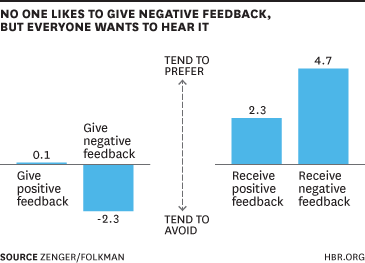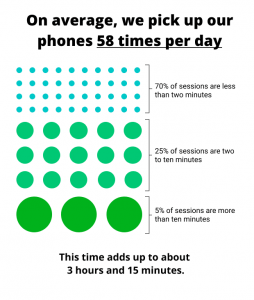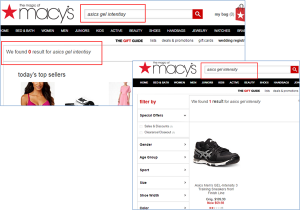
Most companies are moving towards a more frequent feedback cycle, which requires a lot of effort from everyone.
Most companies also spend an incredible amount of time and energy training managers on how to give feedback more effectively.
But this means nothing if the receiver of the feedback isn’t able to handle it.
It’s the feedback receiver that controls if the feedback is listened to, they have to understand what it means, and they’re responsible for making the change.
Without them, none of this means anything.
Everyone knows that feedback is important to helping us grow, but most of us get defensive, angry, and insulted.
It’s a natural reaction for us to fight back when we hear negative feedback.
Let’s look at why this is, and then suggest a few ways that you can get better at receiving feedback.
Do Employees Really Want Feedback?
This is a complex question with a complex answer.
The answer is yes and no. Research shows that employees crave feedback, but neuroscience shows that our brains perceive feedback as a social threat.
Yes – Employees Crave Feedback
Research from Zenger/Folkman, a leadership development consultancy found that by roughly a 3:1 margin, people want corrective feedback more than praise, because it helps them improve their performance.

This graph is really interesting, and highlights some of the key problems in organizations.
Look at the difference between the second column and the fourth column.
Most managers don’t enjoy giving negative feedback (not very surprising), but employees love hearing it.
The secret is how the feedback is delivered.
In their research, a full 92% of people agreed with the statement that “Negative feedback, if delivered appropriately, is effective at improving performance.”
Those who rated their managers as highly effective at providing them with honest, straightforward feedback tended to score significantly higher on their preference for receiving corrective feedback.
This is a good lesson for managers.
Many people suggest doing what’s called a “feedback sandwich” when giving negative feedback, but it often doesn’t work. A much smarter approach is to be honest and straightforward. Your employees will appreciate it.
No – Our Brains Don’t Like Feedback
There is a lot of neuroscience and psychology that makes receiving feedback so hard.
Our brains want to protect us, and receiving feedback is perceived by the brain the same way a physical threat like someone chasing you is.
Because criticism can feel like an actual threat to our survival, it makes it so much harder for us to hear.
The problem with criticism is that it challenges our sense of value. Criticism implies judgment and we all recoil from feeling judged.Tony Schwartz
In the book Management Rewired: Why Feedback Doesn’t Work and Other Supervisory Lessons from Brain Science, author Charles Jacobs shows that when people receive information that is in conflict with their self-image, their tendency is to change the information, rather than changing themselves.
As humans we also have a tendency to focus more on the negative. This is known as the negativity bias. This is important for managers to understand, because feedback will always have a greater impact on employees than praise.
Tips For Receiving Feedback Better
It’s all in your head.
Of course, all of these tips are easier said than done, but you can work on making yourself better able to take the feedback. You want to try and become a little less sensitive to the feedback, and remember that it’s meant to help you.
Executive coach David Rock has developed the SCARF model to help identify things that are likely to trigger social threats. By understanding these, you can start to lower your sense of social threat.
Status: Status is our perception to how we compare to others. Feedback often comes from someone with a higher status than you, so you might respect it more than if a colleague was giving you feedback. With the colleague, it’s unclear at the moment if they’re assuming a higher status.
Certainty: Certainty is how certain we feel about the future. In terms of feedback, it’s hard to be certain of exactly what will be said to you. It’s okay though, prepare yourself mentally.
Autonomy: Autonomy is known that you have some control in what’s happening in the future. you don’t have much autonomy with feedback, you’re likely forced to respond to the feedback.
Relatedness: Relatedness is how similar or different are we to those around us. It’s important that we feel comfortable with the person giving us feedback. The more of a connection you have, the more receptive you’ll be.
Fairness: Fairness is our assessment of if we’re being treated fairly or not. In one survey1, 55% of employees said their most recent performance review had been unfair or inaccurate.
If you can understand these things and work on your mental capacity to handle and bounce back from feedback, you’ll get better at receiving feedback every day.
Here are a few other ideas you can use.
Ask For Feedback Often
They say practice makes perfect.
If you can learn how to get into a mindset of continuous improvement and actively ask for feedback to improve, you’ll naturally get better at receiving feedback.
Some example questions could be:
- What do you think is the #1 thing holding me back right now?
- If you were in my position, what would you change about the way I work?
- Is there anyone I should be spending more time with to learn or teach?
- What do you think are my 3 biggest strengths and 3 biggest weaknesses?
- What do you think is the #1 thing holding me back right now?
Listen Carefully
It’s natural when someone starts criticizing your work to explain yourself and justify anything you’ve done.
Slow down, really take the time to listen to what the other person is saying, and reflect on it.
Use feedback as an opportunity to grow, and think that maybe there’s a reason this person is saying this. Even if they’re wrong, and it’s an issue of perception, it’s still an issue.
Embrace Failure
This is much easier said than done, but in the last few years failure has become very accepted.
This is more of an organizational thing, but you should try to cultivate a culture of acceptance towards failure, where it’s totally accepted and employees feel comfortable taking risks and trying new things.
Focus On One Thing At A Time
Stanford Professor Clifford Nass says that most people can take in only one critical comment at a time2, so it might make sense to collect feedback frequently and focus on one thing at each session.
That will make it much easier for you to digest the feedback and come up with a plan for improving.
Say Thank You
Never argue with anyone when they give you feedback, even if the feedback is wrong. If you become known as someone who constantly argues and gets defensive when given feedback, everyone will be less likely to give feedback to you in the future, which is a bad thing.
Business & Finance Articles on Business 2 Community
(132)
Report Post









